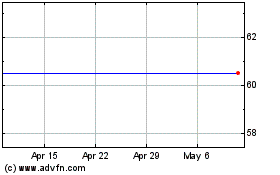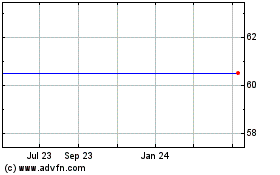Kraft Bid Comes Amid Headwinds for Unilever
February 17 2017 - 10:05AM
Dow Jones News
By Saabira Chaudhuri
LONDON-- Kraft Heinz Co.'s unsolicited $143 billion offer for
Unilever PLC comes at a time of vulnerability for the Anglo-Dutch
giant, the world's second-largest consumer-goods firm by sales
after Procter & Gamble Co.
Chief Executive Paul Polman has more than doubled the
Anglo-Dutch company's share price since taking the reins in 2009,
shifting into higher-end personal-care products and away from a
reliance on food. More recently, though, he has
struggled--alongside much of the rest of the consumer-goods
industry--to boost sales amid a host of headwinds.
Unilever makes most of its sales from emerging markets, where it
has been hit by currency gyrations, rising commodity prices and
tough economic times in countries such as Brazil and India.
Stubbornly low inflation in many markets has made it difficult to
raise prices to make up for slowing volumes.
Quickly changing consumer tastes have also roiled the industry,
especially for packaged food--one of Unilever's biggest portfolios,
which includes Hellmann's mayonnaise and Knorr soup cubes.
Mr. Polman's push into higher-end personal care led to a series
of acquisitions, including a 2016 deal to buy Dollar Shave Club for
$1 billion. In 2015, the company bought premium skin-care brands
Murad, Dermalogica, Kate Somerville and REN. The year before,
Unilever created a "prestige" division, which sells high-end
cosmetics and personal-care products.
Unilever was founded in 1929 through the merger of British soap
maker Lever Brothers and the Netherlands' Margarine Unie, which
began making the plant-derived spread in 1872.
It bought U.S. giant Bestfoods for $20.3 billion in 2000,
catapulting its food business into the world's second largest,
behind Nestlé SA, and shifting its portfolio deeper into developed
markets.
But Unilever has in recent years sold off food brands including
Ragu pasta sauce, Wish-Bone salad dressings and Slim-Fast
nutritional supplements.
Mr. Polman's predecessor, Patrick Cescau, who was named CEO in
2005, took steps to overhaul the company's management structure. He
cut costs and merged its two big divisions, food and consumer
products, to allow them to share marketing expertise and
distribution networks.
Mr. Polman, 60 years old, has courted controversy with some
investors for what has been described as a take-it-or-leave-it
style of engagement. A month after becoming CEO in 2009, he
scrapped financial targets. Some investors have also been rankled
by his high-profile push for environmental sustainability. Unilever
representatives didn't respond to requests for comment Friday.
Amid the current headwinds, he started Unilever on a
cost-cutting campaign, including so-called zero-base budgeting--a
management practice popularized by Kraft Heinz shareholder 3G
Capital Partners. The technique is based on justifying all costs
from scratch each year.
The savings are funding an organizational reshuffle at the
company aimed at boosting sales that Chief Financial Officer Graeme
Pitkethly recently described as "the biggest change Unilever has
undergone in the last 10 years." It is restructuring its workforce
to direct more resources to local markets, and giving
product-category-focused teams there more autonomy.
Write to Saabira Chaudhuri at saabira.chaudhuri@wsj.com
(END) Dow Jones Newswires
February 17, 2017 09:50 ET (14:50 GMT)
Copyright (c) 2017 Dow Jones & Company, Inc.
Unilever NV (NYSE:UN)
Historical Stock Chart
From Mar 2024 to Apr 2024

Unilever NV (NYSE:UN)
Historical Stock Chart
From Apr 2023 to Apr 2024
